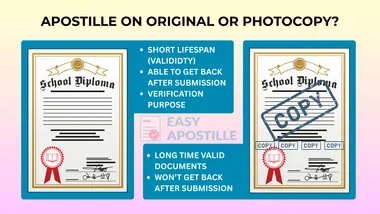When you start the apostille process , the most important question is:
“Do I need an apostille on the original or on a copy?”
Quick answer:
- If the document has a short validity period (PCC/medical) and will be returned after submission, get apostille affixed to the original .
- If the document has a long validity period (graduation, marriage, birth) and may not be returned, get the apostille affixed to a copy (often e-Apostille (QR)).
In practice, your choice depends on document type, the regulations of the destination country and whether you use a sticker or an e-Apostille.
Let’s take a closer look.
How to decide (3 factors that are important)
- Type of document
- Personal: birth/marriage/death, PCC, medical documents, affidavits
- Educational: Degree, diploma, grade sheets, transcripts
- Business: POA, contracts, invoices, CoO, board resolutions
- Regulations of the destination country (college, embassy, employer, immigration authority)
- Some insist on an apostille on the original.
- Others accept notarized copies with an apostille- especially if the originals are retained.
- Type of apostille
- Sticker apostille: physical sticker on the original.
- e-Apostille (QR): digital apostille from scans; widely accepted in the Hague countries (but check if your recipient prefers a sticker).
When you need to apostille the original the certificate/document
Choose stickers on the original if:
- The recipient specifies this in their checklist (university/employer/immigration).
- They must check the security features (embossing, watermark) with the sticker.
- The office is known to refuse copies or only keep certified originals.
- The documents are only valid for a short period of time.
Common examples
- PCC for background checks (valid for 3-6 months). In this case, the police clearance certificate is only issued for a unique reason. For example, a PCC for immigration to the country.
- Medical certificates/vaccination certificates. These are usually only valid for 1-3 months and are required for a specific purpose.
- Some university admissions require apostilled original degrees/grades.
- Immigration/registration offices for family documents (birth/marriage).
- Work visas where the HR department insists on an original apostilled degree to verify authenticity.
Pros: generally understandable; fewer queries later.
Cons: Your original leaves your hands; reissue may take some time if kept.
Note on provisional certificates: Many universities treat provisional transcripts at deadlines like graduation and may require an apostille on the original provisional transcript. Always follow the recipient’s written instructions.
When to apostille a photocopy (copy)
Choose the apostille on a copy (often e-Apostille) if:
- The document has a long validity (e.g. graduation, marriage/birth) and the authority is likely to keep it.
- You need to keep the original for later use/verification.
- The recipient expressly accepts apostilled copies.
Common examples
- Many embassies require educational documents to be presented for visa applications. In this case, you must keep the original. So do it on photocopies.
- Personal documents such as birth/marriage certificates must be presented to confirm your identity. The apostille on photocopies is therefore the better option.
- Business documents (contracts/POA), the originals of which remain in the company’s files.
Pros: protects your original; often faster; easy QR verification.
Cons: some authorities still insist on a sticker on the original- confirm it first.
Quick Guide — Original vs Copy
| Document type / case | Safer choice | Why |
|---|---|---|
| Degree certificate | Copies (sticker) Copies (e-apostille) Original (Sticker) | Commonly required for university/employer scrutiny. |
| Marksheets / Transcripts | Copies (sticker) Copies (e-apostille) Original (Sticker) | Copies often accepted; sealed transcripts may be separate. |
| PCC | Original (Sticker) Copy (sticker) | Short validity and raise only for certain purpose |
| Medical/Fitness | Original (Sticker) Copy (sticker) | Short validity; QR is enough for verification. |
| Birth / Marriage / Death | Copies (sticker) Copies (e-apostille) Original (Sticker) | Civil/immigration offices often demand originals. |
| Affidavits (name change/single-status) | Copies (sticker) Copies (e-apostille) Original (Sticker) | Mostly accessible as public documents |
| Commercial (POA, CoO, invoices, board resolutions) | Copy (sticker) Copies (e-apostille) | Businesses usually apostille true copies; originals remain on record. |
Practical advice for visa applications
- Student Visa (EU/US): Universities often accept apostilled copies of marksheets/transcripts; embassies may require original PCC or original birth certificate.
- Work Visa (Middle East): Employers typically want apostilled original degree + original PCC.
- Dependent/Family Visa: Many posts require apostilled original marriage and original birth certificates.
- Business/Trade: Apostilled copies of POA/invoices/CoO are usually fine—no need to risk originals.
Country & authority rules change. Always read the latest checklist from your recipient.
Key takeaways
- Check the checklist first. If it says “apostille on original,” don’t send a copy.
- As a rule of thumb: personal/civil → originals, educational/commercial → copies often fine (but verify).
- e-Apostille (QR) can be faster and safer where accepted.
- If you’re unsure, share a scan—we’ll confirm scan vs notarized copy vs original before you proceed.
Still deciding? Send your document scan and the recipient’s requirement to EasyApostille . We’ll advise the correct route (Sticker vs e-Apostille, original vs copy), then handle pickup, submission, and safe return end-to-end.
